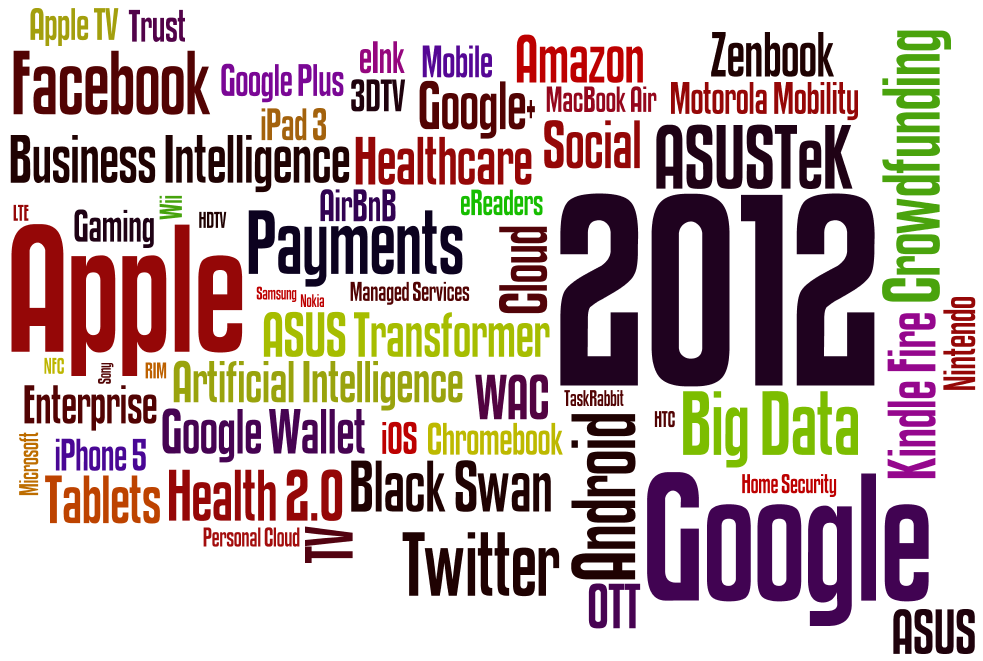 That’s not my title! I owe thanks to blogger AnneMarie Ciccarella for that title. You might imagine my thoughts reading it. It blew me away! It was gratifying and exciting, and it’s not just that one title – that’s how it’s been all month with reporters, bloggers, and users as they get exposed to Medivizor and share their thoughts. AnneMarie was among several bloggers (we love you all!) whom have written about us and encouraged their readers to try Medivizor out. As a result, many users requested and received invitations to our early access, signed up, and began using Medivizor.
That’s not my title! I owe thanks to blogger AnneMarie Ciccarella for that title. You might imagine my thoughts reading it. It blew me away! It was gratifying and exciting, and it’s not just that one title – that’s how it’s been all month with reporters, bloggers, and users as they get exposed to Medivizor and share their thoughts. AnneMarie was among several bloggers (we love you all!) whom have written about us and encouraged their readers to try Medivizor out. As a result, many users requested and received invitations to our early access, signed up, and began using Medivizor.
Tag Archives: Google
My 2013 Predictions
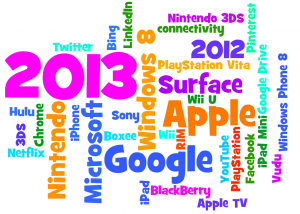
Continuing the annual tradition: Last year, my predictions for 2012 turned out to be remarkably good with 85% accuracy! That’s even better than the 77% accuracy of 2010 and 2011 predictions. If you want to check it out yourself, here’s the scorecard.
I loved the video summary Google did for 2012. I actually didn’t mention many of these developments. So surely you must consider my predictions not “all that will be”, but rather, what will be within specific areas that I’m focused on. Obviously, there’s a lot more going on that I don’t touch on.
The TED-Talk-a-Day Diet
A few years ago, I was excited for every new disciple I brought in on the “TED-secret”. Now, that it is no longer a secret and most everybody knows about it, I want to suggest a new concept: The TED-talk-a-day diet. This is a diet of continuous learning and inspiration, in digestible portions. You know TED Talks are great – why not make them a permanent part of your life?!
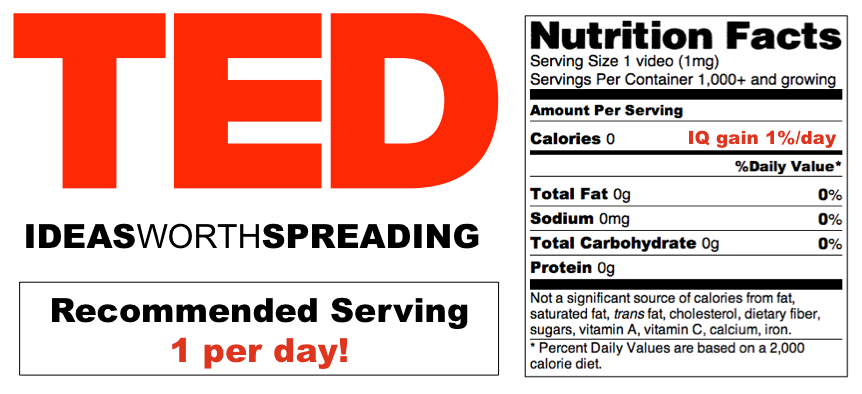
Continue reading The TED-Talk-a-Day Diet
My 2012 Predictions
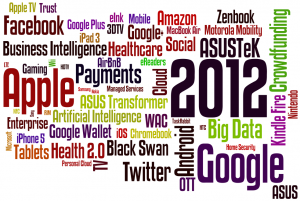 For the past 5 years I’ve been privately tracking the accuracy of my predictions, I must admit that my results have been pretty good. For the last two years I’ve been publishing annual prediction podcasts within Amdocs called DoxCast which, together with Adi Lachman, I’ve co-created and co-hosted. DoxCast gave me an opportunity to be “on the record” with my yearly predictions – for 2010 and 2011. My accuracy on these is 77%. With these results, it seems appropriate to start a new tradition on my blog – annual predictions for the year to come. Without further ado, here are my predictions for 2012 in no particular order: Continue reading My 2012 Predictions
For the past 5 years I’ve been privately tracking the accuracy of my predictions, I must admit that my results have been pretty good. For the last two years I’ve been publishing annual prediction podcasts within Amdocs called DoxCast which, together with Adi Lachman, I’ve co-created and co-hosted. DoxCast gave me an opportunity to be “on the record” with my yearly predictions – for 2010 and 2011. My accuracy on these is 77%. With these results, it seems appropriate to start a new tradition on my blog – annual predictions for the year to come. Without further ado, here are my predictions for 2012 in no particular order: Continue reading My 2012 Predictions
Communication Chaos!
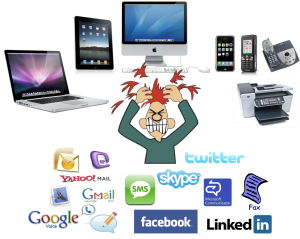 Have you noticed that the more means of communications we have, it appears as though we might be communicating less? To illustrate the problem, I created a list of my communication patterns.
Have you noticed that the more means of communications we have, it appears as though we might be communicating less? To illustrate the problem, I created a list of my communication patterns.
Let’s begin with the devices I use:
- My mobile phone – an iPhone – on me all the time. Charged at night on my bedside, but silent and on my belt all day. It’s connected to the Internet but only when I am traveling domestically (otherwise, it’s occasionally connected on WiFi). Loaded with over 200 apps, including Mail, Skype, Twitter, Facebook, LinkedIn, Viber and many more communication apps. The phone has a voice mail that I check rarely – about once a month! Continue reading Communication Chaos!
CES 2011 Wrap-up

It’s quite a challenge to add to the plethora of CES 2011 blogs. This post puts together some of my key observations. I didn’t touch on everything I saw and might have even missed key insights, so it’s not “the definitive” guide to anything CES. The show is huge and there were over 140,000 people there, so it wasn’t easy to catch all the action. But I did see a lot, and gain some insight along the way:
“Appcessories” are key ingredients to Apple’s success
Updated on January 7, 2011: Thanks to feedback, it has come to my attention that there were some errors in the original post, for which I apologize. I therefore updated the post to correct these errors. As always, this blog reflects my views and opinions and does not necessarily reflect opinions of anybody else. I am personally responsible for any errors I make, and therefore am glad to correct.
When people talk about Apple’s success with the iPhone, they attribute some of it to the huge success of the Apple App Store that has over 300,000 applications that were downloaded over 7 billion times (as of Oct 20, 2010).

Apple’s App Store is bigger, in terms of numbers, than any other mobile application store. But this provides only part of the picture. I think there are actually three key ingredients to Apple’s success with the iPhone – together they make up what I now call “appcessories“:
Continue reading “Appcessories” are key ingredients to Apple’s success
How Apple Can Still Beat Android
 Last week – what most predicted – has finally happened: Android passed Apple iPhone in global units sold. This was no surprise. Google’s Android has a much more effective distribution mechanism than Apple’s iPhone. Apple’s iPhone is made by one manufacturer, Apple, and in the US, is only distributed by one service provider – AT&T. On the other hand, Google’s mobile operating system, Android, runs on many hardware manufacturers’ devices (HTC, Motorola, Samsung and others) and is distributed by many service providers in almost every region. It was just a matter of time until this strategy paid off for Google.
Last week – what most predicted – has finally happened: Android passed Apple iPhone in global units sold. This was no surprise. Google’s Android has a much more effective distribution mechanism than Apple’s iPhone. Apple’s iPhone is made by one manufacturer, Apple, and in the US, is only distributed by one service provider – AT&T. On the other hand, Google’s mobile operating system, Android, runs on many hardware manufacturers’ devices (HTC, Motorola, Samsung and others) and is distributed by many service providers in almost every region. It was just a matter of time until this strategy paid off for Google.
This raises the question: Will Android do to the iPhone what Windows has done to the Macintosh? More specifically, will Android make iPhone a niche solution? Even though the Mac was the first successful computer to have a graphical user interface and a mouse, Microsoft came from behind with Windows and reduced the Apple Macintosh computer to about 4% market share. It did so by making Windows practically ubiquitous – distributed by practically all other PC manufacturers.
Is Google Android going to do the same to the iPhone? All early indications are that it will.
So what might Apple do in order to prevent history from repeating itself?
Why OTT Video Might Not Be So Disruptive After All
Earlier this year, I presented at OTTcon. This was the first major conference about OTT (video) ever, and was attended by a few hundred people and many industry players. Coming into this conference, I was under the distinct impression that OTT is a significant disruption to traditional service provider business and that it would have a significant and negative long-term impact on that marketplace. The common wizdom is that service providers who have the most to lose will be the least motivated to support OTT, and will therefore be the last to embrace it, if ever, will ultimately face the disruptive impact most of all, possibly losing their video distribution business over time.
But—I came out of the conference with the opposite conclusion! It’s not that OTT won’t be disruptive – it will, but not “as” disruptive as one might expect. And most of the market players will probably remain in place and not be sidelined by OTT. If it were truly disruptive, it would harm the existing service providers more than I expect it actually will.
Why? Because I think the current service providers themselves will ultimately be the ones that enable OTT content, thus avoiding a major disruption – whether they know it right now or not! In fact, right now, they’re doing very little, and most OTT is being enabled by others. So why do I think they’ll wake up in time? Read on to find out.

Some background
In case you’re wondering, OTT means “over the top” and it refers to all traffic that flows “on top” of broadband access, typically provided by someone else. For the service provider who provides the access to the Internet, this is just “data”, but for the consumer, this is “video”. While there are many other types of OTT content, this conference was only about video. When I’ll use of the term and “OTT” here, I’m referring only to over-the-top video content.
Continue reading Why OTT Video Might Not Be So Disruptive After All
